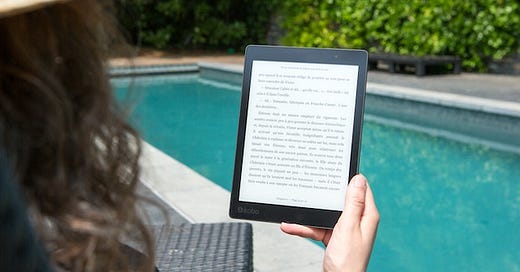Louisa May Alcott wrote in one of her lesser-known novels, “She is too fond of books, and it has turned her brain.” About a century later, this same condition hit me. As a kid I had to be hauled out of my local library as close to closing time as I could push it. My parents struggled for years to keep me in enough books — purchased or borrowed — to satisfy my little word-addled brain. As I grew up, I wrote, and read, constantly, editing my high school newspaper for three years, and eventually studying journalism in college.
Then, cue the internet in the early aughts. My fascination with the global, multimedia allure of websites, drew me so far in that I couldn’t get out — and I didn’t want to. I wrote and edited for websites, eventually building a full-time digital career. I slowly, unintentionally, let go of paper anything in the process, as my brain transformed to a constant slideshow of pixels, zeroes and ones.
When I found myself burnt out and depressed in 2018, grieving the death of a close friend and the state of my country, I turned off the tv news for the first time in my media-obsessed life. I was also beginning to worry that twelve years of digital immersion had destroyed my attention span, and that I couldn’t reprogram it. So I did what made sense to a Gen-X slacker/ overachiever kid, and set a lofty Goodreads goal of 52 books, after not reading more than 10 books annually in well over a decade. If my brain didn’t work on its own motivation, I figured my usual approach of goading myself into accomplishment with absurd expectations and preemptive shame might help. (I have since done a lot of therapy, which was a very good call.)
I didn’t go completely analog, however. I gave up my pointless ban on e-readers, got a Kindle, and blew through 71 books by December 31.
In this process, I fell back in love with my library, a relationship I’d abandoned while I spent that decade reading the entire internet. When I came back — and they will always take you back! — I discovered that my local system had really leveled up. Among the apps I could access with my library card, Libby was my favorite; I could search, sort and place holds on materials from classics to brand-new bestsellers. I could borrow e-books, audiobooks and magazines automatically.
In the four years since beginning my reading experiment, I’ve broken 100 books a year, with Libby’s help. With access to a book on my phone, I read while waiting in line, on hold, or on lunch breaks. I listen to my audiobooks in my car (I can listen to an entire audiobook now, too, which is one hundred percent reading; don’t get me started.) I’ve even found other Libby fans on social media, and we talk about our book recs and the struggle of having all the holds we really want to read come available on the same day. (Can’t handle that? I can delay delivery of one or more of them, because Libby really knows that I’m a busy person.)
Libby was also a huge help to my ADHD struggle. I know exactly when all of my books are due with a button tap — no more logging into the website or finding my paper receipt, like some sort of suburban pioneer. No worries about hunting down hardbacks and softcovers to return, either; at a certain hour the book pops back into the ether of the app from whence it came, available to the next person in line.
And if I lag and don’t finish a title? It still goes back on the due date; no rationalizing that I’ll drop it off tomorrow that ultimately turns into a week from now. Libby is a tough-love literary friend who cares, but doesn’t care if you didn’t finish your book, because she’s got a line and a schedule to keep.
Libby is that thoughtful. So if you want to be friends with a very smart and organized app to prepare for our robot overlords, this is definitely one I’d recommend.
It also makes my little reader nerd heart so, so happy.







Yes!! I love Libby! I read 135 books last year because they are always at my fingertips! Please note that I mostly read romance novels, so 135 books isn’t saying much, lol 😂